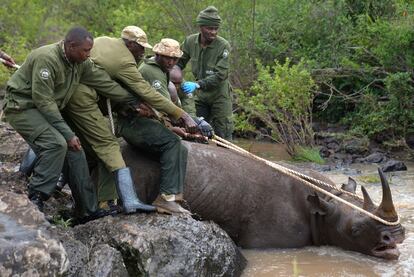Kenya embarks on its biggest rhino relocation project
A previous attempt at moving rhinos in the East African nation was a disaster in 2018 as all 11 of the animals died

Kenya has embarked on its biggest rhino relocation project and began the difficult work Tuesday of tracking, darting and moving 21 of the critically endangered beasts, which can each weigh over a ton, to a new home.
A previous attempt at moving rhinos in the East African nation was a disaster in 2018 as all 11 of the animals died.
The latest project experienced early troubles. A rhino targeted for moving was successfully hit with a tranquilizer dart shot from a helicopter but ended up in a creek. Veterinarians and rangers held the rhino’s head above water with a rope to save it while a tranquilizer reversal drug took effect, and the rhino was released.
Wildlife officials have stressed that the challenging project will take time, likely weeks.
The black rhinos are a mix of males and females and are being moved from three conservation parks to the private Loisaba Conservancy in central Kenya, the Kenya Wildlife Service said. They are being moved because there are too many in the three parks and they need more space to roam and, hopefully, to breed.
Rhinos are generally solitary animals and are at their happiest in large territories.
Kenya has had relative success in reviving its black rhino population, which dipped below 300 in the mid-1980s because of poaching, raising fears that the animals might be wiped out in a country famous for its wildlife.
Kenya now has nearly 1,000 black rhinos, according to the wildlife service. That’s the third biggest black rhino population in the world behind South Africa and Namibia.
There are just 6,487 wild rhinos left in the world, according to rhino conservation charity Save The Rhino, all of them in Africa. Kenyan authorities say they have relocated more than 150 rhinos in the last decade.
Six years ago, Kenya relocated 11 rhinos from the capital, Nairobi, to another sanctuary in the south of the country. All died soon after arriving at the sanctuary. Ten of them died from stress, dehydration and starvation intensified by salt poisoning as they struggled to adjust to saltier water in their new home, investigations found. The other rhino was attacked by a lion.
Some of the 21 rhinos in the latest relocation are being transferred from Nairobi National Park and will make a 300-kilometer (186-mile) trip in the back of a truck to Loisaba. Others will come from parks closer to Loisaba.
The moving of the rhinos to Loisaba is poignant given the region was once home to a healthy black rhino population before they were wiped out in that area 50 years ago, said Loisaba Conservancy CEO Tom Silvester.
Kenyan wildlife authorities say the country is aiming to grow its black rhino population to about 2,000, which they believe would be the ideal number considering the space available for them in national and private parks.
Sign up for our weekly newsletter to get more English-language news coverage from EL PAÍS USA Edition
Tu suscripción se está usando en otro dispositivo
¿Quieres añadir otro usuario a tu suscripción?
Si continúas leyendo en este dispositivo, no se podrá leer en el otro.
FlechaTu suscripción se está usando en otro dispositivo y solo puedes acceder a EL PAÍS desde un dispositivo a la vez.
Si quieres compartir tu cuenta, cambia tu suscripción a la modalidad Premium, así podrás añadir otro usuario. Cada uno accederá con su propia cuenta de email, lo que os permitirá personalizar vuestra experiencia en EL PAÍS.
¿Tienes una suscripción de empresa? Accede aquí para contratar más cuentas.
En el caso de no saber quién está usando tu cuenta, te recomendamos cambiar tu contraseña aquí.
Si decides continuar compartiendo tu cuenta, este mensaje se mostrará en tu dispositivo y en el de la otra persona que está usando tu cuenta de forma indefinida, afectando a tu experiencia de lectura. Puedes consultar aquí los términos y condiciones de la suscripción digital.








































